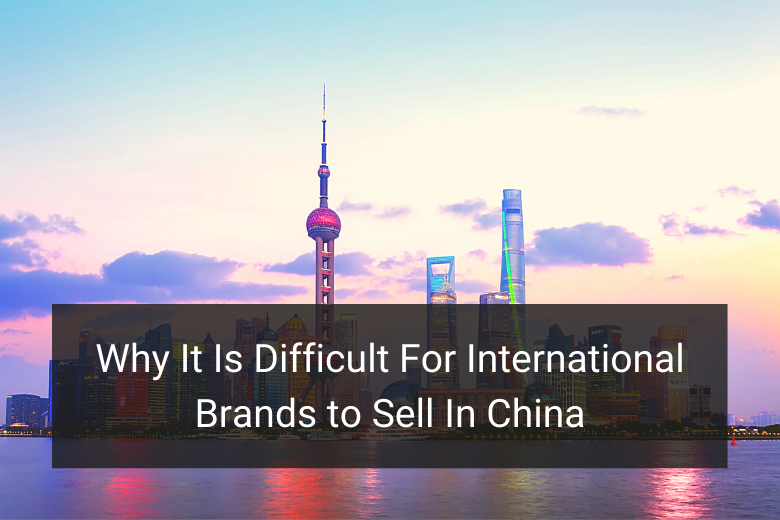Pre-COVID times revealed that China had been a growing economy.
Successful rates and promising business growth made it an attractive market for brands all over the world. However, the Chinese population has been more diverse than ever during the last few years entering the new decade.
It has become exceedingly challenging for international businesses, whether big or small, highly established or relatively new, to enter the Chinese marketing domain.
According to the figures posted by China Internet Watch, 80% of the marketing resources are in the hands of the top 20% of the local giants making it increasingly difficult for new foreign competition.
If you consider these numbers, it is almost impossible for international brands to establish themselves in a highly competitive market like China.
10 Challenges Faced by International Brands for Selling in China
Here we have listed down ten of the major challenges faced by international brands for selling in China.
1. Distributors don’t trust international brands
As a global brand entering a foreign market, it is difficult to find distributors that readily agree to sell your products.
There are potentially no resellers or franchise owners that will take up your brand or allow you to open a new store. The Chinese sales structure is very different than what we are familiar with around the world.
The Chinese distributors are mostly friendly towards working with locally known and highly recognized brands over big global names.
However, as the younger generation continues to dominate the overall population, digital marketing is reshaping the Chinese market. If your brand has a solid image on the internet, there is a high chance for success operations other than virtually.
2. The Chinese market does not buy new brands
One of the major challenges a brand faces to sell in China is that Chinese customers are not eager to be the first ones to lay their hands on your products.
Nobody is willing to buy a new product from an unknown foreign brand. They don’t venture out to new products compromising over what they buy and have known all their lives.
Even if you have a somewhat known global brand, it is still like you have to start from the very beginning for your brand if you successfully wish to establish yourself.
3. The positioning of foreign brands
A foreign brand needs to be seen as a well-known brand outside of China to establish itself in the Chinese market.
It is supposed to offer high quality to retain the positive image and to gain recognition reasonably quickly. Spreading positive messages through a successful marketing campaign and using the right platforms to promote your brand will consequently influence the Chinese masses to invest and take an interest in your brand.
The positioning of your brand amongst the well-reputed brand territory of the locals is much responsible for your future success as a brand.

4. Replicas and rip-offs
The Chinese imitations and rip-offs of famous and big brands like Gucci, Chanel, and LV are well-known locally and globally.
These Chinese product makers have infiltrated the international market with cheap rip-offs that are of comparatively low quality and even lower in price. But not only have these products made it hard for originals to find their place in China but all over the world.
Especially the areas where there is considerable demand for branded products, but due to the high prices, people prefer the cheaper low-quality rip-offs that do the job just the same.
5. Targeting the Chinese community
There is a massive difference in the communication of a famous brand and of a new one.
Just as how more accessible it becomes for a global brand to establish themselves almost anywhere in the world as there is an already existing demand for their product, it is challenging for a new brand to start over. The reason is that no one will readily buy a new product, especially when they are not even eager to buy globally renowned brands in the first place.
For instance, if Chanel organizes an event, it would be comparatively easier to invite people than if a writing brand likes to buy essay online hosts an event.
6. Exploring online marketing in China
Even the online marketing domains in China are challenging to conquer, given the local bans on different platforms where businesses can actually market their products.
You will have to adapt to the platforms that the Chinese masses have accepted and social media platforms that they use. Understanding their stance at branding and advertisement can be a challenge in its own given the fact that how would you target the audience that may take an interest in your products.
However, the recent innovation for brands through the app called TikTok has eased these challenges steadily.
7. No scope for small businesses
As we discussed earlier, there is basically no scope for small businesses at all.
The big players in China are very strict about negotiating with big brands and always find their own corporate advantage in letting them operate in the local territory. You can only deduce how difficult it can be for a smaller foreign brand to make such negotiations where you have no incentive to offer other than the quality of your product.
Then again, there is no guarantee that soon enough, you’ll see a cheaper replica of your product being sold completely taking over your customer base.

8. Recruitment for foreigners
If you are a smaller brand like coursework help looking to set up an office in China, then recruitment would be a hassle for you.
In China, unlike fresh talent looking to get employed anywhere for experience, the younger here look to work with famous brands. They would instead prefer to work for free with a renowned brand than to be paid to work for a smaller one.
The Chinese don’t seem interested in working for startups where working is more of a responsibility than a new learning challenge that can benefit them in the long run.
9. Branding for the Chinese masses
Branding is a major game player in China hence more challenging to master than usual.
With their attraction towards color, culture, and traditional logos over modern, minimalism, and textual concepts, brands have found it hard to appeal to the masses.
However, the internet sensationalizing of brands has dramatically worked in favor of the business as people recognize the brand from what they have seen online.
10. Solution for selling products
There is no ultimate solution to sell in China.
It is a step-by-step gradual procedure of a globally known brand either starting over according to the demands of the Chinese or a new brand picking up pace as it grows on the foreign soil.
As a brand, you should start by establishing a trustworthy relationship with your local employees and letting them first take an interest in what you have to offer before you introduce to the masses.
Bottom Line
All in all, China is a vast economy and an even bigger country with its own marketing regimes.
If you are a globally strong brand, then some struggle would be worth to find a customer base there if there is already not a rip-off being sold of your brand.
However, if you are a smaller startup, then maybe China shouldn’t be your first choice. Certain neighboring countries would be better first before you can cross the borders and find yourself a market in the world’s largest economy.
Author
[one_third_first] [/one_third_first][two_third_last]John William is currently working as a Marketing Strategist at Dissertation Assistance, an excellent platform where you can get coursework writing service. He has a keen interest in international marketing standards. Thus, you can check his blogging platform for further reading, where he shares his expertise in this regard.[/two_third_last]
[/one_third_first][two_third_last]John William is currently working as a Marketing Strategist at Dissertation Assistance, an excellent platform where you can get coursework writing service. He has a keen interest in international marketing standards. Thus, you can check his blogging platform for further reading, where he shares his expertise in this regard.[/two_third_last]

Ready To Upgrade Your Logistic Solution?
Speak to Floship ecommerce logistic consultant about improving your global support chain today





